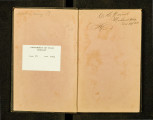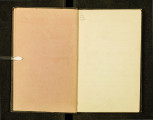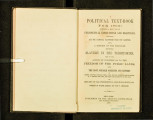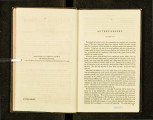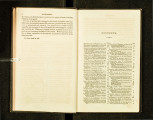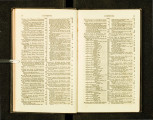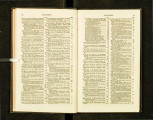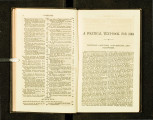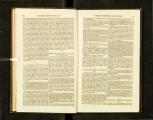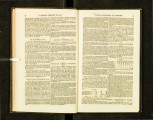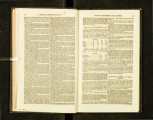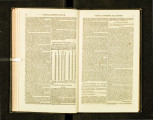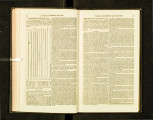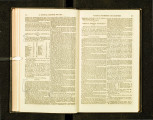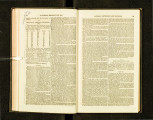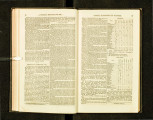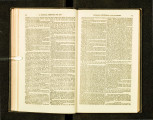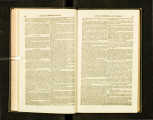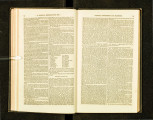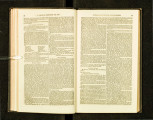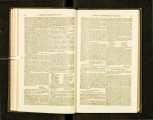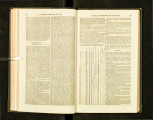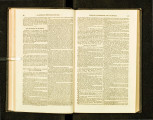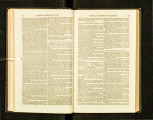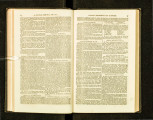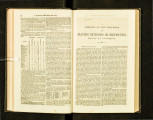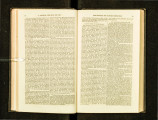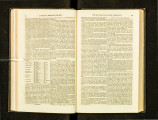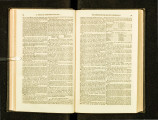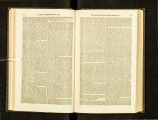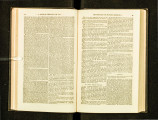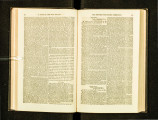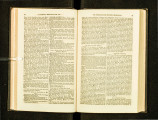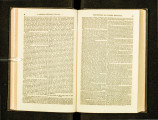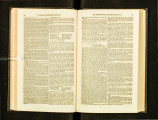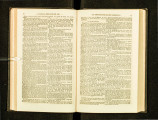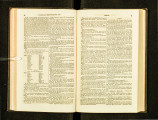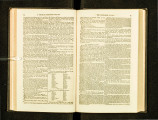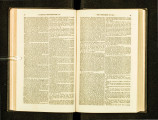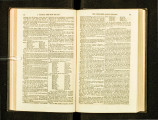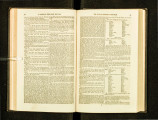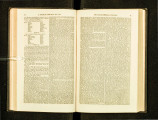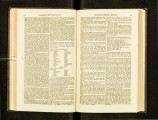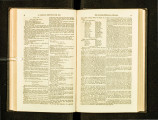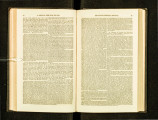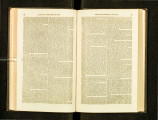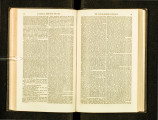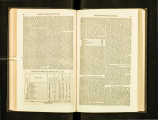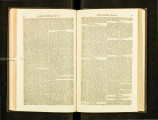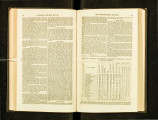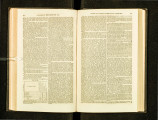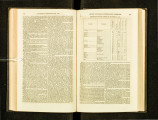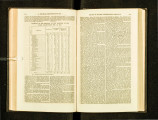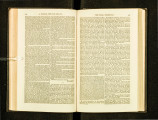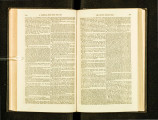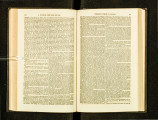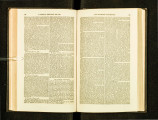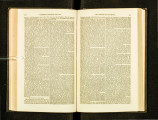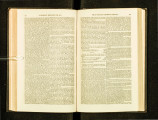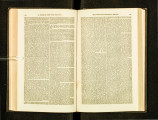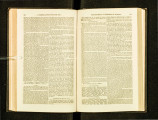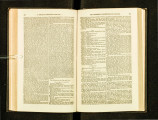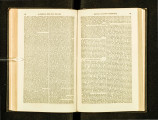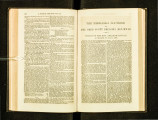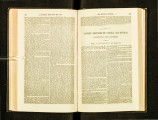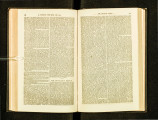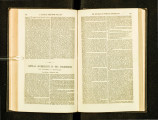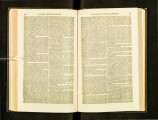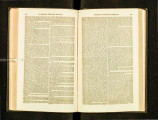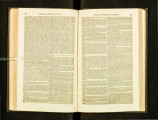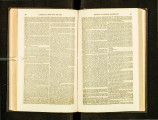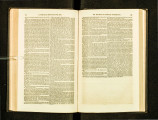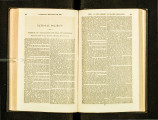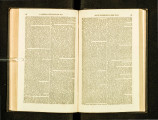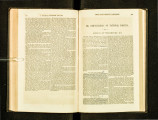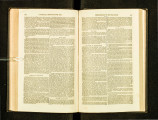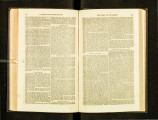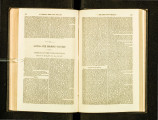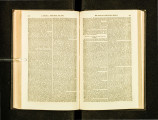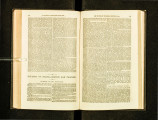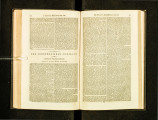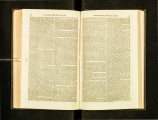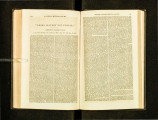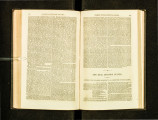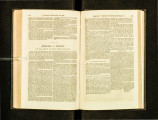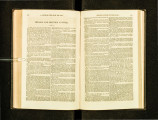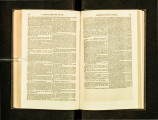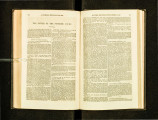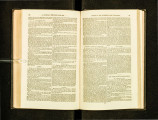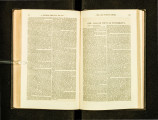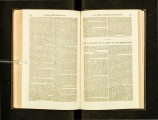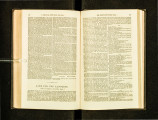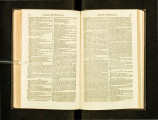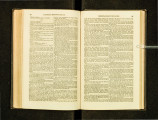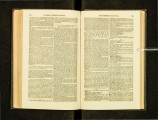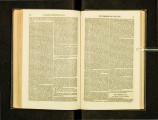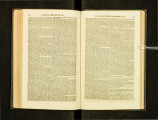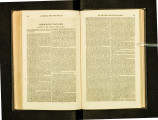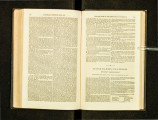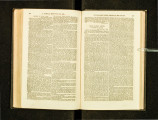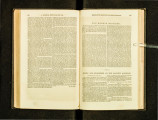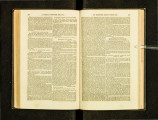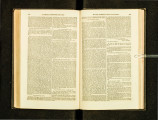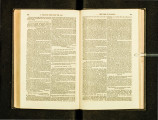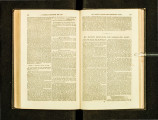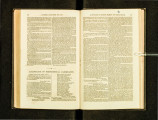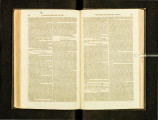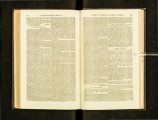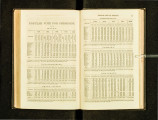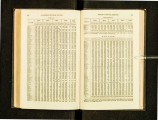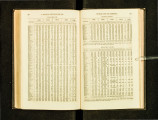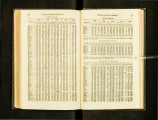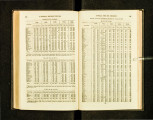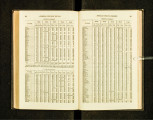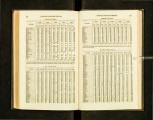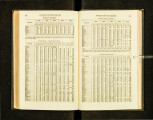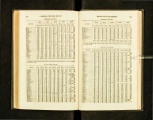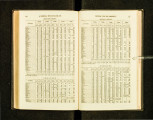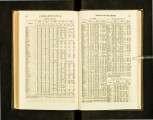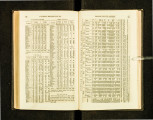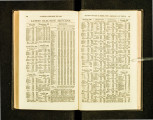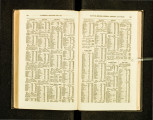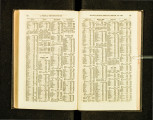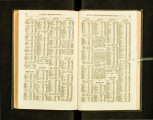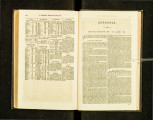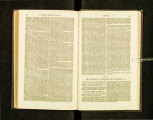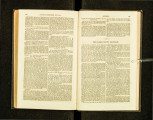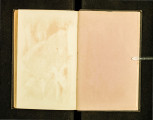| OCR Text |
Show i4 A POLITICAL TEXT-DOOK FOR 1860. Kiner ef Ohio presided nnd James G. Birney of I Florida, or on the high seas, are uncon~titutlonn~, and all • l!l! 1 • ' • 1 attempts to hold men as property within the II nuts of ~x· lhchtgan, was unaOlruously nonuuated for ~re- elusive natlon~tljurisdictlon, ought to be prohil>lteu by law. bident, with Thomas Morris, of Ohio, fot· Vtce-, R~ohed, '1'hn~ u."~ provhlion or the Cor~stitution ~f.the Pre idcnt. Amoucr the rc:Jolvcs adopted were United States, wh1ch confers cxtrnol'(hnary poh!1cal . 0 J>Owcrs on the owner11 of slaves, and thcrcl>y const1tut-tbc followmg : log the two hundred and fifty thoul!and slaveholders In ReBolocd That human brotherhood is a cardinal prln- the Slave States a privlleged aristocracy; an<l the prociple of tru~ Democracy, as well as of pure Christianity, vision for the reclamation of fu gitive slaves from service, which spurns all inconsistent limitations; and neither are Antl-Ue}>ublican in their character, dangerous to l.be \be political party which repudiates it, nor the political Uberties of the people, and ought to be abrogated. rystem which is not based upon it, can be truly Demo- Resolived, 1'hat the practical operation of the second ~J'a tic or permanent. of these provialons, is seen in the enactment of the act R esolved That U1e Liberty Party, pJaclng itself upon of Congress rrsp ecting persons escaping from their mas' lhls broad J;rinciple, will demand the absolute and un· ters, which act, If the c~nstr~ction given to it byl ~he }Ua.lified divorce or the Oeucml Government from SuJ>rcmc Court of t.he Umt.cd States In the case of 1 r1gg 'lavery, and also the restoration of equality of rigl1ts, 'V8. Pennsylvania be correct., uulllfi~ the habeas corpus among men In every State where the part-y exists, or nets of all the States, takes away the whole legal security &:~ay exist. ' of personal freedom, and ought therefore to l>c iwmeili· H e8olived, That the Liberty Parly J1as not been organ- ately repealed. ized for alily temporary purpo~e by ln~ercstcd politicians, Re8ovved, 'l'hat the peculiar patronage and suppor& but bas arisen from among the people in consequence of hitherto extenued to ~lav~ry und Sl~vehol~lng, lly the a conviction hourly gaining ground, that no other party General Government, ought to be Jmmed1atcly with· in the count;y represents the true principles of American drawn, and the example and influ.ence of National liberty, or tbe true spirit of the Constitution of the authority ought to be arrayed ou ~be Side of Liberty and United States. Free Labor. Re8olive<l That the Lil,erty Party has n ot b~en organ- Re8olived, That the practice of the General Govern-ized merely for the overthrow of slavery; Its first de- ment, which prevail~ In the Slave ~tates, of employing clded effort must Indeed be directed against sla.vehold- SlaYes upon the pul>llc works, ln:Ht·atl of free hLborers, ing as the grosse~t and ~ost revolting manifestation of and paying aristocratic mn:<ters, with l\ view to secure 01 despotism, but it will also carry out the Jll'inciple of reward political services, is uUe. ly inuefensiiJle anti equal rights Into all its practical consequences and ap- ough_t to be abandoned. plications, and support every just measure conducive to l~esolived, 'J'hat freedom or speech, and of the press, individual and social freedom. and the right of )>etltlon, nnd \he right of trial by jury, Resolived, That the Liberty Party is n ot a sectional are sacred and inviolal>sc:; and that nil rules, regula· party but a national party; was not originated In a de- tions and laws, in derogation of either are oppr es~ive, un· sire to accomplish a single object, but in a comprt:heu- constitutional, and not to l>e endured by free people. sive regard to the great interests of the whole country; Resol!ved, That we r egard voting in un e111inent deis not a new party, nor a third )>arty, but is the party gree, ns a moral and religious duty, which, when exerof 1176, reviving the principles of that memorable era, ci~ed, should be by voting for those who will do all in and striving to carry them into practical application. their power for Immediate Emancipation. Rc~obve!..l, 'l'hat it was unders:ood in the times of the R eliol!vecl, 'l'hat this Convention recommend to the Declaration and the Constitution, that the existence of friends of Liberty in ull those .Free States where any in· slavery in some of the Stutes, wa~ in derogation of the equulity or rights and privileges exists on account of principles of American Liberty, and a deep stain upon color to employ their utmost energies to remove all such the character of the coun~ry, nnu the implied faith of the remn:'lnts and effects of the 81a ve sy!Stcm. States and the Nation was pledge1l1 that !!lavery should Where<U 'l'he Constitution of the~e United States is never be extended beyond its then e~isting limits, but a series of ~grecments, covenants, or contracts llctween should be gradually, and yet, at no distant day, wholly the people of the Unlt.:d States, each with all and all ~bolished by ::ill4tc authorit.y. with each; and Re.~ovvt!d, '!'hat the faith of the Stat es 1tnd the Nation lVILer ea8, 1t Is a principle of universal morality, thnt llus pledged, was most nol>ly redeemed by the voluntary t.he mornl laws of the Oren tor are paramount to all .\bolition of 81nvery lu several or tiJe States, and by the human lnws; or, in the langung~ of rut AJ>Ol!tle, that •doption of the Ordinance of 11!:>7, for the government "we ougllt to obey God rather than men;" and, Jf the Territory northwest of the river Ohio, then the only lV herew1 The principle of common Jaw- that any rerritory in the United 'tat cs, and consequently the only contract co'venant or agreement, to do an act deroga· crritQry sullject in thi~ respect to the control ·or Congress tory to ~atural rigl;t, is vitie~.t--!d and annulled by its in· 'oy which Ordinance lavery was forev er excluded from herent immorality- has been recognized IJy one of the -i1e va.st regions which now compose the States of Ol.io, justices of tbe upreme Court of the United States, who l .ndlana, Illinois, Michigan, and the Territory of Wiscon- in a recent case expres!Siy twlds that "auy contract am, and an Incapacity to !,car up any other than freemen, that rests upon such n basis is void;" nnd, was impressed on the soil itself. IV hereas The third clause of the second section of Resolveci, That the faith of the States and Nation the fourth 'article of the Constitution of the United t~us pledged, has been shamefully violated by the omis- ::itat.es, when construed as providing for the surrender ot BIOn on the part of many of the ~tates, to take any n Fugitive ~lave cloeiJ •• rest upon such a basis," In that measures whatever for the Abolition of !:!lavery within it is a contract t~ rol> a man of n uatuml r ight-namely, ~heir rcs~cct.ive limit ~ ; by the continu~tnce of Slavery his natural right to his own liberty; auJ 1~, therefore, 111 t~~ UJst.nct of .Columbia, and in the Territories of absolutely void. Therefore, . Loulstana and Flomla; l>y the Legislation or Congress; Beso!tved That we hcrcl!y give it to he <lJstlnetly by the protection all'on.lcd by national legislation and understood 1by this nation aud the world, that, as aboli· n~gotin.tion to alavcholdiug in American vessels, on the tionists considering that the strength of our cause lies mgh seas, employed in the coa~twbe Slave 'l'rallic; and in its righteousness and our hope for it in out· conformity by. the extension of slavery far beyond Its original to the laws of God and our respect for the niOIITS OF llm1ta, by a~ts of Cougrtlls, admitting new Slave States MAN, we owe It to th1e l::overeign Huler of the universe, &.8 into the Umo~. a proof of our all~glance to l11m,ln all our civil relalio~s . Resolved, I hat the fuud:unental truths of the Declara- and office.'! whether u.s private citizens or as pubhc tion or Independence, that ull men 1~re endowed by their functlonarl~s sworn to rmpport the Constitution of thc ~reat.or with certain inalh:na.hle rights, among which are United States, to regard aud to treat the third cl~tuse of hfe, hberty and the pursutt of happiness, wa~ mude the the fourth 1trticle of that instrument whenever applied fundamental law of our Nnti•nal Government, l>y that to the ca~e of a fugitive 11la.ve a.s utt~rly null a.ncl void, amendment or the Cou:>titutlon which declares that no and consequently as forming ~o pn.rt of the Constitutloo p~rson shall be deprived of life, liue1·ty or property, of the United l:)tates, whenever we are called upon Ol Without due proccsl! of law. aworn to support It. R uwl'ved, '!'hat we recognize as sound, t!1e doctrine R IJI'io!tved 'l'hnt the power given to Oonsress by tht maintained by slaveholding. jurists, that tilav~ry Is Constltutlo~, to provide for calllng out the militia to against natural l'i.ghts, and stnctly loc~d, and that 1ts ex- suppress insurrection, does not make it the duty of the lstence a~d contmuancll rests on no other su1'110rt than Government to maintain Slavery by military force, much State Leg1slation, and not on any authority of Oongrcss. less does it make it the duty of the citiz~us to form a Re8olve~l, 'J'hat the General Government has, u~der part oft~uch military force. When freemen un~heath tho the Constitution, no power to establish or contmue sword it should l>e to strike for Liberty not for Despot.- Sia very anywhere, and therefore that all treaties and ism. ' nets of Congress establishing, continuing or favoring Re8olved Th1tt to preserve the peace ofthe citizens, ana Slavery in the District of Columbia, in tho Territory or secure tlle b1lesslngs or freedom, th~ Legislature of each OJ NATION..\.L CONVENTIONS AND PLATFORMS. 15 the Free St..ates ought to keep In force suitable sta.tutetl proposition.. rhis appeal was also laid on ~he rendering it penal for any or its lnhabltl\nts to tranaport, table •r aid In tl"a.nsporting from such State, any person • . d aought, to be thu~ tra.nsported, merely becnuse subject After G~n. Taylor hnd been nommate , Mr. to the slave laws of 11.ny other Stnte ; this remnant or in· Charles Allen, of Mu.s~achusetts, olfered tho dependence being accorded to the Free States, by the followiucr. decision or the Supreme Court, lu the case or Prlgg ve. o ' ~he t;tate or Pennsylvania. Ruol!oed, Th;~.t the Whig Party, through Its represtn· ta.tlvcs here, agrees to abide by the nomination ot Gem. 'VHfG ~ATIO~AL CO~VENTION, 18-18. A Whig Nittional Convention met at Philatlolphi: t, on the 7th of June, 18-18, over which John M. Morehead, of North Carolina, presided. After It rather sLormy session of three duys, Gen. Z:tchary T;ty lo r, of Louisi;ma, was nomin :Lted for Pl'csideut, and }[illard Fillmore, of New-Yot·k, for Vice-President. Gen. 'l'1tylor was nominat ed on the fourth ballot, as follows: Zachary Tayler, on condition that he will accept thG nomination 1\S the candidate of the Whig Party, and adhere to its great !undtunental principles-no ext.o.slon or slave territory-no acquisition of foreign terri tory by conquest-protection to American industry, ancJ opposition to Executive usurpation. The president immediately decided the reso. lution out of order, and no further notice wa(' taken of it After the nomination for Vice-President ha.d been made, Mr. McCullough, of New-Jersey, offered the following: B.ALLOTDWS. IMI. 2d. Taylor .. .. • . ..... ... 111 118 Oby ........ . ..... ... 97 86 Scott . ..... ....... . . • . 43 49 Wehstcr . ........... 22 22 Clayton . . . . . . . . . . . . . . 4 4, McLean .. ... ..... .... 2 1 Total.. . . ... ...... 279 280 3d. 133 74 154 11 1 279 4th. 111 82 63 18 219 Ruo'ttJ~d, That Gen. Zachary Taylor, of Louialana, and Millard Fillmore, of Ne\v-York, be, and they aro hereby unanimously nominated as the Whig candidates for President and Vice-President oC the Uuited Sta.tea. Mr. Fillmore w~ts nominated for Vice-Presi< kut ou the second ballot, by the following vote : Mr. D. R. 1'ilden, of Ohio, proposed the followin «, expressing the opinion that some such decla.mtion by the Convention would be necessary, in order to secure the vote of Ollio for the nominee : R611oktd, That while all power is denied to Coofl'es:<~, unde~; the Constitution, to control, or in any way 111tec· fere with the institution of 81u.very wtUain tlle se.-era.l States or this Union, it nevertheless has the power and it is the duty of Coogr·eas to prohibit the introduction or existence or Slavery In any territory now possused, Of' which ma.y hereafter be a.cquired,by tbe United Bt&tes. 8 A. LLOT! NGS. l&t. 2d. l'tl. Filtmorc... . . . . . • . .. . . . . ... ... ... 115 173 a bbotL Lawrence ......... .. .. . ... ... 109 83 Scattering . . . . . . . . . . • . . . • . ......•...• ISO 4 Total ... ... ......•...•...••..•... 214 260 Of the scattering vote cast on the first ballot, George Evan"~, of Ma.ine, received G; '1'. M. T. MeKenncn, of Pu.., 13; Andrew Stewart, of P11., 1 t; and J ohn Sergeant, of Pa .. , 6. The Convention adopted no Platform of Principlt•s. After it had been o rg-anized, and n r esolution offl'red to go into a ballot for candidates for PreRident and Vice-President, !(r. L ewi:; D. Campbell, of Ohio., mo,•ed to ar11end u::~ follows: Resolce<l, That no candidate sh:lll be entitled to receive tire nomination or this Convention for !'resident or Vice- l•rcsident, unless be has given assurances that be will abide by 1~ncl surrort the nomination; tbat H nominated he will accept the nomination; that be will consider ltimself the candidate or the Whigs, and use ·~ll prope. influence to bring into practical oper&tioa the principles aad measures of the Whig Party. This re::;olution met with decided opposition, tt!ld the pre 'idcnt ruled it out of order, from which deci~i o u Mr. Campbell appealed, and in a sp<'ech contended that it was strictly in order to define what sort of candidate should be voted f<H', and to d c lare that noue but sound Whigs should receive important nominations at the hands of a. \Vhig National Convention. The af'pca.l was t<lb led. ){1·. Fuller, of NeiV York, offered the followiII g' ; ll~solfJ((f, That as the first duty ot the represeQt&tives of the Wh.lg Pa.rty ill to preserve the r•rlnciples and integl'it. v of the party, tl1e cla.ims or no candidate ca.n be COIL'iidered by this Convention unless such ca.n<llda.te stauds pledged to support, in good ra.itb, the nominees au d. to be the exponent or Wb.Jg Principles. ' The rm.•Ri<h nt rulc(l thiA resolution out of order, and h{ r. Full ·r a ppealcd, insisting that DO true Whig conld rcllSOuably object to his This resolution, like all others affirming Whig or Anti-Slavery principles, wa.s ruled out of order, and laid on the table. A. motion was made to divide Mr. UcCullough's resolve, so tha.t the vote could be takefl. separately on President and on Vice-President, whep, after discussion, the resolve was withdrawn. Mr. llilliard, of Alabama., offered a. resolve iL1dorsiug Gen. Taylor's letter to Captain Allison, which, meeting opposition, was withdrawn; so the Convention adjourned without pa.ssing any resolves having reference to 'Vhig prin· ciples, the issues before the couutry, or of con· currence in the nominations .. RATIFICATIO~ MEETING .A.T PIIILADELPIIIA... On the evening of the last day of the session (9th June), a ratification meeting was held at Philadelphia, at which Gov. Wm. F. Johnston, of Pa., preside d, and at which speeches were delivered by Governor }forehead, Geu. Leslie Coombs, of Ky., and several others, and at which the following resolves, reported by W. S. Price, of Pennsylvania, were adopted : 1. lluolfJ6<1, That the Whigs of the United States, here assembled by their Representatives, heartily ratlty the nominations ot Gen. Za<:hary Ta.ylor as Pr~ldent., and Afillard Fillmore as Vice-President oC the United States, and pledge themselves to their support. 2. Ilesok~d, 'f'h&t In the choice or Gen. Taylor a.s the Whig Candidate Cor President, we are glad to discover sy mpa.tlay with a great pOJIUiac sentiment tbrougho11t the nation- a sentiment which, having Its origin In admiration ot great military success, has been strengthened by the development, in every action and every word, ot sound conserv&tive opinions, and or true fidelity to the great example ot former days, and to the prlnclples ot the Constitution as administered by it.J founders. 8. Ruok~d, Tb:t.t Gen. Taylor, In s:s.ylng that, had ho Yoted in 184.4, b would have voted th• Whig Uclr.oe_ |



